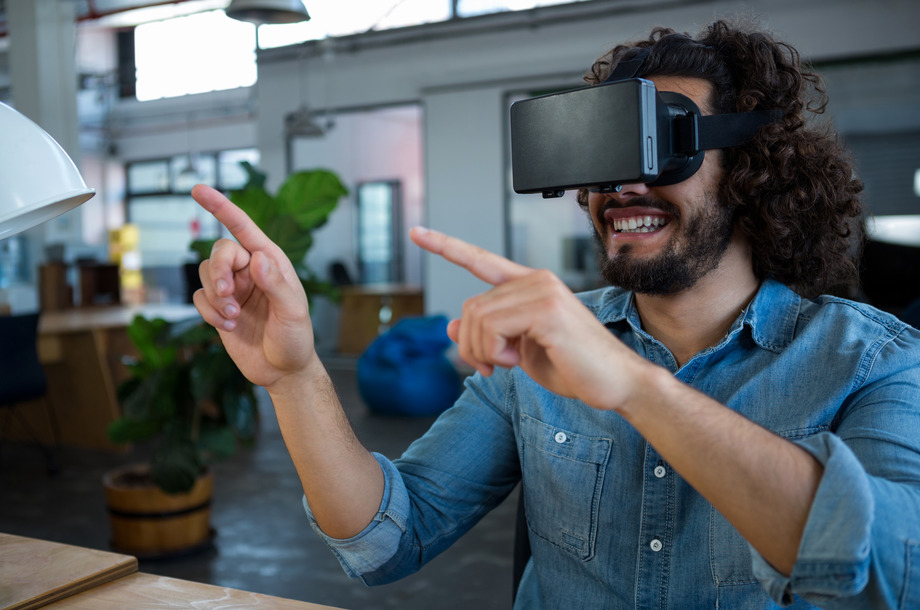Augmented and virtual reality kicked off as an incredible improvement in entertainment, bringing an extraordinary experience that had previously been described only in science fiction books. However, from the technologies of the future, VR and AR have turned into an effective business tool that can significantly reshape not only the company but the entire industry.
1. VR and AR Solutions for Business Improvements
It is surely true that virtual reality is applicable for any purpose in the company: from conducting remote interviews with a potential candidate to large-scale marketing campaigns to promote a new product. Moreover, in recent years, virtual reality headsets have become more accessible to consumers, which allows companies to offer a more exciting experience, reaching the needs of their customers.
Entertainment and Gamification
Due to the incredible feeling of total immersion in the virtual world, VR games are very popular. Easy accessibility is among the benefits of augmented reality, making it an efficient way to entertain and engage. However, in addition to entertaining content, such games may contain useful educational or advertising information, be used for social and marketing research, to demonstrate opportunities of virtual reality in business. The simplest example of such a symbiosis: placing real information on a game advertising banner instead of embedding annoying pop-ups.
Healthcare
Healthcare is one of those areas where the use of VR and AR are of great importance today. There are ready-made applications that allow surgeons to undergo training or preliminary model complex operations. Applying technology for these purposes literally saves lives. Also, there is the augmented reality application allows to scan the patient’s body and make his veins visible, which allows to make injections and put droppers more efficiently. That is, nurses no longer need to make a few punctures, causing discomfort to the patient.
Retail and Online Shopping
Retailers and distributors have a great way to provide their consumers with an unusual pre-purchase experience. The “try before buy” is provided due to the possibility of interaction with the product in virtual reality. It can be a new suit, a coffee machine or even a car, all this can be tested by wearing VR glasses.
Augmented reality apps for business also allow the company to improve its customer bond and connection. For example, by offering the opportunity to place a piece of furniture in the interior, using only the phone. This allows consumers to make a more meaningful purchase, reduces the number of returns, and increases customer satisfaction and brand loyalty.
The main advantage of VR and AR for retail is that now customers can test any products and make a purchase without leaving home.
Communication and Collaboration
One of the new and effective uses of VR in the workplace is to conduct meetings, workshops, brainstorm sessions and presentations. This is especially true for remote teams and outsourcing companies. Video calls and conferences do not provide the necessary sense of communication for all participants, while virtual reality allows remote team members to join their colleagues at the table and participate in a live discussion. This is one more step towards creating a truly digital workplace to ensure total employee immersion and engagement.
Moreover, thanks to an immersive experience, virtual meetings can be held with partners from different parts of the world when it is not possible to provide a physical presence.
2. Prototyping and Modeling
Creating an interactive fully working prototype is among high production costs. Creating an interactive fully working prototype is among high production costs. VR usage is modern, safe, and time-saving. Thanks to this technology, you can completely prototype future products without physical construction, which reduces costs. Another advantage is that any mistake is much easier to fix virtually than re-create the prototype. The ability to interact with the prototype increases its functionality due to the experience gained before its actual creation: various options can be added or removed. Thus, the time to the market for a newly created product is significantly reduced as well as the number of necessary updates or enhancements.
Prototyping can be applied in various industries: from the production of new equipment to the creation of architectural projects. A virtual presentation, in this case, will be the best demonstration of all the individual features of the project. This can be of particular importance when obtaining additional financing or creating a report for investors, one way or another virtual reality can positively affect business success.
3. Virtual Training
Virtual reality offers great opportunities for safe training and learning. The active use of VR applications for training in healthcare has been mentioned above. The environment as close to reality as possible is simulated for surgeons: patient data are scanned; virtual images of their assistants are created. This allows them to immerse themselves in the created world and freely manipulate new tools or try out new techniques.
Virtual reality business applications can be adapted to any training needs of staff. This can be a simulation for sellers and representatives in order to improve their communication skills, or situationally training scenarios in case of fires, earthquakes and other natural disasters.
Virtual training is also used in aviation, replacing expensive bulky simulators with more modern and portable VR solutions. This gives invaluable experience to pilots, which can later be used during real flights.

4. Travel and Navigation
Travels are getting closer thanks to virtual reality channel creation, introducing users to the beauties of different corners of the planet. However, the same technology is already used by several hotels and resorts, due to which their profits have significantly increased and customer service has been improved.
Giving the opportunity to virtually visit the hotel room and get acquainted with its comfort, the owners increased the engagement of consumers, stimulating reservations. In fact, there was created a desire to repeat the experience, but already in real life. Virtual travels are also used by various resorts to demonstrate all the beauty and sights and give consumers the opportunity to be elsewhere for a short time. Using technology for informational purposes only, companies can successfully promote their projects and achieve success in business.
Augmented reality also significantly improves travel, allowing to move freely in unfamiliar places. It can be smart glasses that display the necessary information about the road and possible alerts or a virtual guide that “tells” the history of the place the tourist is visiting. Also, augmented reality programs may contain information about the menu of restaurants and cafes, opening hours and visitor reviews; nearby entertainment venues and events.
5. Customer Connection Enhancement
Thanks to the customer-oriented approach, many companies are moving towards digital transformation and establishing a deeper connection with their customers.
This is especially important now in the era of digital gadgets that simplify life. Now the leading position in the market or in a niche industry is occupied by one who offers original customer experience.
Augmented reality for business has allowed to reach a new target audience of consumers, which keeps pace with the development of technology. Virtual reality only strengthened this connection by providing the opportunity to visit virtual showrooms of shops, try on clothes and try goods without leaving home.
Now companies can use the modern method of interacting with their customers, offering them exactly the services they need. The flip side of such a service is the collection of the necessary information about the reaction and interaction of the consumer with the product. The analysis of this data allows to better understand consumers, their preferences and to further improve customer service.
Moreover, thought-out VR marketing helps increase brand loyalty and reach potential customers. Virtual reality has all the prerequisites to become the most popular channel for interaction and consumer involvement through a new experience. It is predicted that it is in virtual reality that companies will be able to reveal the potential of their products and services, forming the need and desire to purchase them.
There are a lot of successful VR and AR use cases in business. Various industry leaders adopt these technologies to increase revenue, reduce costs, improve customer service and employee productivity. Forecasts promise that augmented and virtual realities will actively develop in future decades, thanks to the extraordinary opportunities that they offer for business growth. An increase in investment in this area is forecasted by the end of 2021, which means that new AR and VR solutions for business should be expected shortly.
Read the blog to learn how is augmented reality used in businesses and feel free to use form below or email at info@computools.com to contact Computools’s specialists to find out how AR and VR solutions can enhance your business.
Computools
Software Solutions
Computools is a digital consulting and software development company that delivers innovative solutions to help businesses unlock tomorrow.









“Computools was selected through an RFP process. They were shortlisted and selected from between 5 other suppliers. Computools has worked thoroughly and timely to solve all security issues and launch as agreed. Their expertise is impressive.”